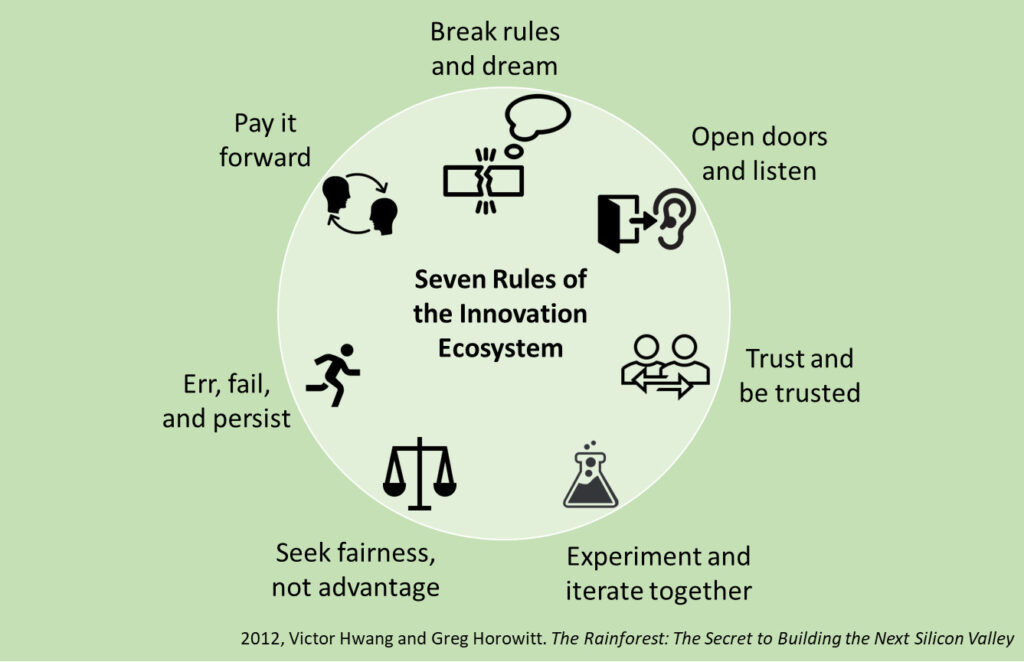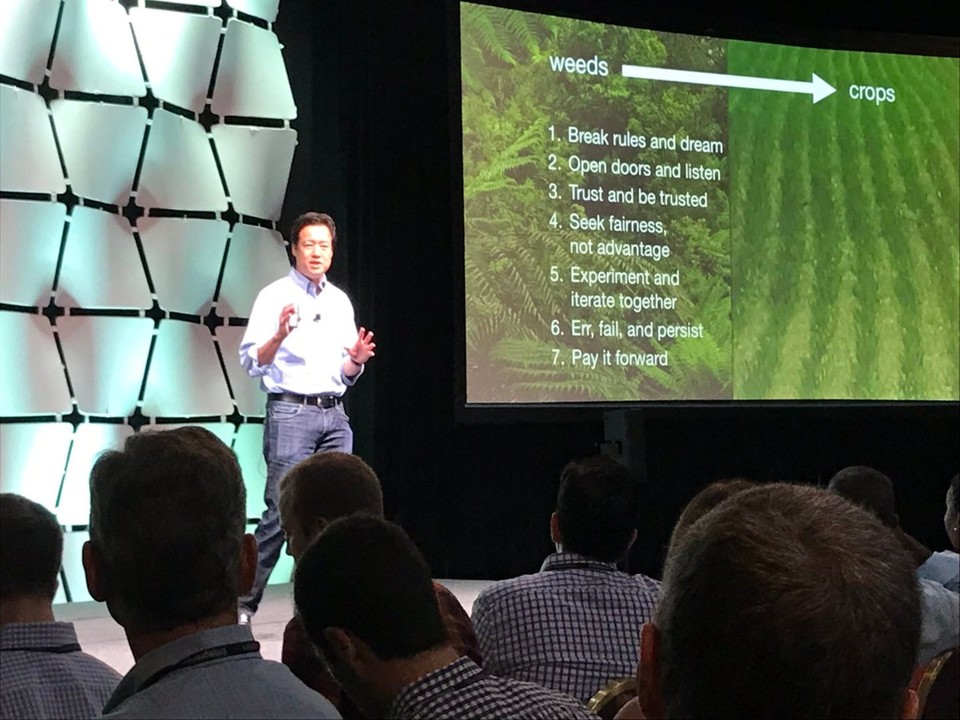Culture in an innovation ecosystem: Seven rules of the Rainforest
What makes a startup ecosystem work? How do disconnected innovation hubs, accelerator programs, angel investors, government agencies, and startups work together? Why do some innovation ecosystems with less resources thrive while others with more struggle? What is different about this open network of startup culture versus established financial, education, corporate, and government institutions?
The answer lies in differences in culture – the underlying rules and beliefs that govern behaviour. Conventional institutions are based on rules and conventions put in place to mitigate risk, produce conformity, and ensure sustainability of established companies. The startup ecosystem by comparison is based on finding the most rapid path to market, breaking convention, and finding cracks in sustained competitive advantages.
A great articulation of these rules, and a description of the social and psychological science behind them, can be found in The Rainforest: The Secret to Building the Next Silicon Valley by Victor Hwang and Greg Horowitt. The book applies a metaphor of a rainforest to describe open innovation ecosystems. The Rainforest flourishes based on diversity and a seemingly unstructured balance of collaboration and competition.
Like most wisdom in the world, most of this is from others, with some reflections of my own. Take what adds value, and I welcome feedback on their relevance to what you do.

1. Break rules and dream
“Big dreams are considered naive. Fatalism permeates daily life and impedes innovation. Like a disease, it eats away at people’s willingness to aspire to greater things. Without aspiration, without the willingness to believe, nothing can be born. Rainforests thrive because people honour the dream of others as well as their own.”
I have had employees of organisations feel like they had to sneak around to be entrepreneurial out of fear of retribution from the very institutions that created the hubs in the first place. We are taught early why things can’t be done. Alternatively, we can start with the question “What if?” and go from there. What if this could be changed, and what if I could be the one to change it? What is the difference I want to make?
2. Open doors and listen
“A thriving Rainforest requires that people treat every conversation like an open invitation and be willing to learn by listening to the other party. Opening doors and listening leverages the most value out of a community’s inherent resources. Any contribution is potentially valuable, so everyone is worth listening to.”
Institutions create value from hierarchies and protected access to networks. The higher up you are in the hierarchy, the more value inherent to your position and greater the cost for access. This can slow down outcomes and isolate value for a few.
One of the main functions I do as a mentor is open doors, make introductions, and meet as many people as possible to help as many people as possible. Innovation happens at the cross-section of disparate ideas. These ideas can come from any pay grade, any life experience, any profession. Everyone is given voice, and influence is based on trust and ability to execute rather than position.
3. Trust and be trusted
“Rainforests cannot thrive without trust among strangers. Trust fast or die. Trust everybody that you work with. You’ll get screwed every once in a while, but people will want to do business with you. Systems that are low on trust tend to be expensive and inefficient. In high trust, people are more willing to share, more potential collaborations are explored, more transactions are consummated, and innovation is accelerated. Trust in the Rainforest requires a style of transparent communication. Trust depends on social patterns that encourage openness without defensiveness, honesty without argument, and opinions without grievances.”
I would be unable to do what I do if trust was not the default response. As soon as I start to distrust, or trust is not given to me, I slow down and need to move on to where there are more rapid flows of knowledge and value.
Start and end every conversation with “How can I help?” and let outcomes and action prove the trust.
4. Experiment and iterate together
“People learn not to build for perfection, but to build for iteration. There is no substitute for experimentation and iteration when it comes to prototyping new products and testing them out in the real world with real customers. Experimentation is driven by action not theory. In describing the early days of Facebook: “It wasn’t the kind of culture where it was a good idea to say ‘I have an idea.’ It was the kind of culture where it was a good idea to build a prototype of your idea, and then show people.”
Many people experience life as a series of success and failure. Organisations can say they want to experiment, but end up creating cultures of repeatedly getting in trouble until you get it right or fired. This can be difficult to change based on short-term reinforcing systems of our political structure of votes and economic drivers of shareholder returns.
An alternate perspective is one of learning and not learning. My own life is characterised by periods of not learning, breakthrough, and on to the next stage. Frustration and suffering is simply feedback. Define the smallest iteration that can add value, ship continuously, and get feedback as fast as possible to learn and grow.
5. Seek fairness, not advantage
“The Rainforest requires that individuals strive to create fair transaction with each other, not advantageous transactions. A system in which people feel they will be treated fairly lowers barriers to transactions, reduces fear, and keeps people incentivised to pursue aspirations together.”
Whether you are climbing a corporate ladder or claiming market share, you can compete without taking advantage of others in the supply chain or organisation. Taking advantage of others can make for an immediate gain, but it is a risky proposition. Unless you are in a monopoly or capture an immediate sustained competitive advantage, there can be long-term transaction cost as word gets around.
Competition thrives when each player focuses on being the best that it can be. Rather than taking advantage of others, focus on being awesome at your unique value proposition and execute on that.
6. Err, fail, and persist
“There is no real failure, only learning. Failure is merely a hypothesis that has been tested and shown to bee false. It is not the failure that matters; what matters is the knowledge you have gained through the failure and the perseverance you have shown picking yourself up and trying again. The Rainforest does not only encourage people to endure; it depends on it. The process of building an innovative enterprise is so hard, so unpredictable, and so complex that before succeeding, entrepreneurs make thousands of mistakes, and may even fail several times.”
We are conditioned by society and evolution to be risk adverse. Related to rule four above, learn and try something new.
7. Pay it forward
“It is in everyone’s best interest for there to be little hierarchy. The organisational structure of the Rainforest is mostly horizontal, not vertical. When you help someone, you may not expect them to repay the favour directly, but you do expect that someone else will repay the favour in some other way. It is as if individuals are making a transaction with the Rainforest as a whole, based on faith that the system ultimately rewards people who are helpful to others.”
Normal models of success stop short at pay out for the individual. Few individuals become a success based on their contribution alone. Greatness stands on the shoulders of countless others who have come before.
We don’t have much time on this planet, and we can’t take anything with us. Help as many as you can, as much as you can, as fast as you can. Be an incredible success in what you do, and ideally be passionate about what you do, so you can help more. Contribute in some small way to leaving the world in a better way then when you came in.
Your thoughts and feedback are welcome.

